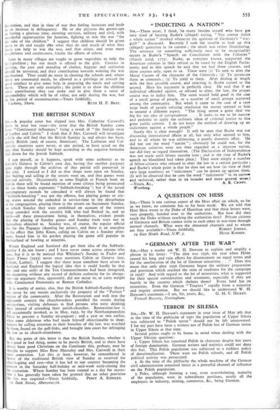"INDICTING A NATION"
Sut,—There must, I think, be many besides myself who have got very tired of hearing Burke's (alleged) saying, "You cannot indict a whole nation" invoked whenever the question of Germany's "war- guilt" is discussed. Recently I took the trouble to look up this (alleged) quotation in its context ; the result was rather illuminating. The sentence (or something sufficiently near to be recognisable) occurs in Burke's "Speech on Conciliation with the Colonies" (March 22nd, 1775). Burke, as everyone knows, supported the American colonies in their refusal to be taxed by the English Parlia- ment; and in this speech he said that we had three courses, and three courses only, open to us. These were (r) To seek to alter the Moral Causes of the character of the Colonials ; (2) To prosecute them as criminals ; (3) To yield to them. After dealing at length with the first possible course, and rejecting it, Burke turned to the second. Here his argument is perfectly clear. He said that if an individual offended against, or refused to obey, the law, the proper course was to indict him. The same would hold good in the case of a small group of people, or a number of small groups scattered among the community. But when it came to the case of a very large body of people refusing obedience the matter seemed to him to assume a different aspect. "The thing seems a great deal too big for my idea of jurisprudence. . . . It looks to me to be narrow and pedantic to apply the ordinary ideas of criminal justice to this great public contest. I do not know the method of drawing up an indictment against a whole people."
Surely this is clear enough? It will be seen that Burke was not discussing international affairs at all, but only what seemed to him, and to all whom he was addressing, a purely domestic affair. He did not use the word " nation " ; obviously he could not, for the American colonists were not then regarded as a separate nation, nor did they so regard themselves. (The Declaration of Independence was not made until fifteen months later ; and at the time of Burke's speech no bloodshed had taken place.) They were simply a number of fellow-citizens who refused to obey the law in a certain particular ; and Burke's whole point is that he does not see how (in view of their very large numbers) an " indictment " can be drawn up against them. (It will be observed that he uses the word " indictment " in its narrow and technical, rather than in its broader and more general sense.)






























 Previous page
Previous page